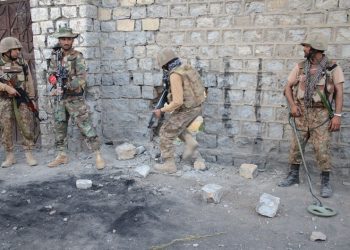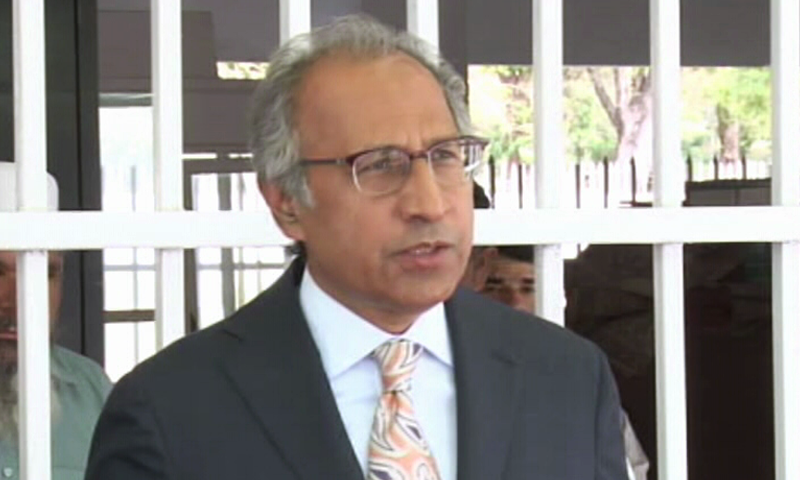Constitution allows Supreme Court to review its decisions, Chief Justice of Pakistan Umar Ata Bandial remarked while hearing the country’s top electoral authority’s petition, seeking a review of the top court’s decision for an election date in the Punjab province.
A three-member bench of the top court headed by Chief Justice Umar Ata Bandial, comprising Justice Ijaz-ul-Ahsan and Justice Muneeb Akhtar heard the case.
After the first hearing, the court adjourned until Wednesday afternoon. It will meet again at 2:30pm tomorrow.
Today’s hearing
During the case proceeding on Tuesday, the lawyer representing the ECP, Sajeel Swati, approached the podium and informed the court that the responses from the federal and Punjab governments had been received by the ECP today.
The CJP remarked that it seemed the ruling party, PTI, had not yet submitted its response. Swati confirmed that the ECP had not received any responses from the PTI or any other political party.
Swati requested the court to grant the ECP an opportunity to thoroughly review all the responses. However, Justice Bandial instructed Swati to proceed with presenting his arguments in the case.
The chief justice assured Swati that if there were any new points to be raised, they could be addressed in the next hearing. The CJP inquired about any potential new grounds that could be included in the review petition.
Meanwhile, Justice Ahsan expressed that if the arguments presented by the lawyer representing the Election Commission of Pakistan (ECP) were accepted, an immediate hearing would be necessary for the review matter. He highlighted that the scope of the right to appeal and review is not the same, as stated in the Constitution.
Justice Munib also noted that granting the ECP’s request would add complexity to the situation.
In response, Sajeel Swati, the ECP lawyer, stated that the Constitution does not impose any limitations on the scope. He suggested that Article 187 of the Constitution could be utilized to ensure absolute justice in review cases.
The Chief Justice of Pakistan (CJP) intervened, cautioning against turning a review into an appeal. He pointed out that Article 184(3) of the Constitution does not grant the right to appeal, emphasizing the need for clarity regarding the scope within the Constitution.
Following this, the ECP lawyer requested the court to issue a detailed order, as it would facilitate the proceedings.
On a different note, Justice Bandial remarked that both the government and the electoral body were demonstrating seriousness in the proceedings.
He recalled that the government had previously raised objections regarding the bench, such as the issue of a full court or the matter of a 3-4 judgment. The CJP questioned Swati about why these arguments were not raised earlier and whether any other institution had influenced the ECP’s current stance.
Federal and Caretaker Government of Punjab’s individual responses to the SC
The federal and Caretaker Government of Punjab have submitted their individual responses to the Supreme Court, adopting the same position regarding the review of the decision. Both governments have taken the stance that the Supreme Court exceeded its authority by setting the election date, and they have requested the court to review its decision made on April 4.
The government argues that the top court undermined the authority of the Commission by setting a specific election date. As Punjab is a province that plays a significant role in determining the central government through its election outcomes, the federal government asserts that the elections in Punjab should be held in conjunction with the National Assembly elections.
The response further highlights that following Pakistan Tehreek-e-Insaf (PTI) chairman and former prime minister Imran Khan’s arrest, widespread violent protests resulted in significant damage to both civil and military properties. Consequently, the security landscape in the province has undergone a notable shift since the events that transpired on May 9.
ECP’s petition
In its plea, the Election Commission of Pakistan (ECP) has argued that while the power to announce election dates is vested in bodies other than judicial institutions, the court lacks authority in this matter, demonstrating the wisdom behind the separation of powers.
The ECP further asserted that, according to the Constitution, the responsibility for conducting elections lies solely with the electoral body, as outlined in Article 218(3) and other relevant provisions. Therefore, the order under review has violated the fundamental principle of the separation of powers and is not legally justifiable.
The ECP contended that conducting fair and just elections to the National Assembly is not possible in the presence of an elected government in Punjab. It argued that the elected government in Punjab possesses substantial resources and influence, which can potentially impact the outcome of the National Assembly elections.
The ECP’s review petition emphasized that the presence of an elected government in Punjab undermines the fairness of the electoral process, as voters are likely to favor candidates affiliated with the political party in power in Punjab.
In response to the review petition, both the federal government and the Punjab Government have filed their replies, aligning with the arguments presented by the ECP.















































